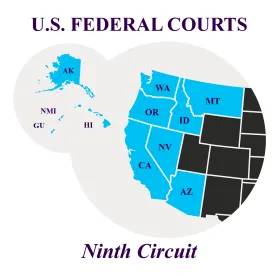Holding
In Cap Export, LLC v. Zinus, Inc., No. 2020-2087 (Fed. Cir. May 5, 2021) (Dyk, Bryson, and Hughes), the Court of Appeals for the Federal Circuit affirmed the district court’s decision to set aside a judgment under Federal Rule of Civil Procedure 60(b)(3).
Background
In 2016, Cap Export filed a request for declaratory judgment of noninfringement and invalidity of Zinus’ patent, U.S. Patent No. 8,931,123 (“the ’123 patent”), drawn to an assemblable mattress support that can be shipped with all of its components compactly packed into the headboard. Zinus counterclaimed, alleging infringement and unfair business practices under California state law.
Zinus also filed a motion for partial summary judgment of invalidity, supported by a declaration of Colin Lawrie, Zinus’ then president and testifying technical expert. In his deposition, Lawrie repeatedly denied knowledge of “disassembled beds shipped in a single box with all components stored in the headboard” prior to the 2013 filing date of the ’123 patent. Id. at *6.
The district court sua sponte granted summary judgment of invalidity to Cap Export, but this decision was vacated on appeal and remanded, “in part because the district court had improperly granted summary judgment of invalidity sua sponte without proper notice to Zinus and had relied on a prior art reference (the ‘bed in a box’ reference) when there was a factual dispute as to whether it predated the ’123 patent.” Id. at *3-4.
About two and a half years later, Zinus filed another motion for partial summary judgment of no invalidity, which the district court granted “in part because Cap Export had abandoned the ‘bed in a box’ prior art reference” and “none of the ‘prior art’ references considered by the Court either anticipated or made obvious the patent claims embodied in the ’123 patent.” Id. at *4. Zinus and Cap Export then stipulated to a judgment of infringement, which included no invalidity of the asserted claims, $1.1 million in damages, and a permanent injunction.
After final judgment, Cap Expert discovered, through documents submitted in a later infringement suit filed by Zinus against another party, that Lawrie’s deposition testimony regarding lack of knowledge of prior art beds was false. Specifically, the defendant in the later infringement suit filed a motion to transfer that was supported by a declaration describing prior art beds having all components packed in a zippered compartment in the headboard. The declaration also included invoices indicating that Woody Furniture had purchased a number of these beds.
Cap Export discovered these documents and sent company representatives to meet with Woody Furniture representatives. Woody Furniture provided Cap Export a 2012 invoice addressed to Jusama Group Consulting Inc. (a sales representative for Zinus), and bearing Colin Lawrie’s signature, for a purchase of 405 beds from Woody Furniture. A Woody Furniture employee also executed a declaration attesting that these 405 beds included “components fitting in the headboard, including the footboard and the longitudinal bar, for shipping.” Id. at *5. Based on this evidence, Cap Export timely filed a motion under Rule 60(b)(3) to vacate the stipulated judgment.
During the ensuing Rule 60(b)(3) district court proceeding, Lawrie presented a declaration, “in which he admitted that his October 2016 deposition testimony . . . was ‘literally incorrect,’ but he asserted that he did not ‘intend to answer falsely’ because he ‘meant that [he] had not seen a bed shipped disassembled in one box with all of the components in the headboard.’” Id. at *7.
The district court found Lawrie’s explanation to be “wholly implausible.” Id. at *8. The court instead determined that Lawrie’s repeated denials that he had knowledge of beds shipped disassembled in one box were affirmative misrepresentations, evidenced by the repeated purchases by Jusama of such beds prior to the filing of the ’123 patent. Moreover, Zinus conceded that there was “documentary evidence of the alleged on-sale prior art beds” in Zinus’ possession throughout the underlying litigation, including additional purchase invoices from 2011 and 2013. Id. at *9. And the district court determined that the prior art beds were “functionally identical in design to the claims in the ’123 patent.” Id. at *10.
The district court granted Cap Export’s motion to set aside the stipulated judgment under Rule 60(b)(3). Zinus appealed.
Federal Circuit
On appeal, the Federal Circuit upheld the district court’s grant of Cap Export’s motion to set aside the stipulated judgment.
Zinus asserted that Cap Export failed to meet its burden of establishing entitlement to relief under Rule 60(b)(3), which provides for relief from a final judgment for reason of “fraud . . . , misrepresentation, or misconduct by an opposing party” Fed. R. Civ. P. 60(b)(3). The Ninth Circuit—home of the district court in this case—had previously held that “Federal Rule of Procedure 60(b)(3) require[s] that fraud . . . not be discoverable by due diligence before or during the proceedings.” Cap Export, at *12.
Zinus’ argument focused primarily on what it contended was a failure of Cap Export to satisfy the Ninth Circuit due diligence requirement. It argued that Cap Export would have discovered documents evidencing Lawrie’s knowledge of the prior art beds, but for its “incompetent lawyers” and their failure to exercise due diligence during discovery. Id. at *13.
The Federal Circuit rejected this argument, finding “no clear error in the district court’s determination that the Ninth Circuit’s due diligence requirement was satisfied.” Id. at *15-16. Although skeptical of the due diligence requirement, the Court held that due diligence in discovering fraud “does not require investigation unless there is reason to suspect fraud.” Id. at 13.
The issue thus is not whether the conduct of Cap Export’s counsel fell below the standard of care for attorneys practicing patent litigation, but whether a reasonable company in Cap Export’s position should have had reason to suspect the fraud—here, that Lawrie had testified falsely—and, if so, took reasonable steps to investigate the fraud.
Id. at *14-15.
Here, the Court found “no showing that there was reason to suspect that Lawrie’s statements were fraudulent.” Id. at *15. Cap Export asked Lawrie several times about his knowledge of disassembled beds shipped in a single box with all components stored in the headboard, and Lawrie repeatedly said he had none. Cap Export also conducted several prior art searches, none of which revealed evidence of Jusama’s purchases of beds from Woody Furniture. Moreover, the Court determined that the information withheld by Lawrie was not “widely available, a matter of public record, or information already in Cap Export’s possession.” Id. at 15.
The Federal Circuit also found that the district court did not abuse its discretion in determining that the misrepresentations prevented Cap Export from fully and fairly presenting its case.
According to the district court, the [prior art] beds were “functionally identical in design to the claims in the ’123 patent,” and “[i]f Lawrie had fully disclosed his prior experience and knowledge of the [prior art] beds, the evidence Cap Export present[ed] now regarding purchases made in advance of the filing of the ’123 patent would have been available for the Court to consider during its prior analysis on obviousness and anticipation, which led to partial summary judgment for Zinus with regard to the ’123 patent’s validity.”
Id. at *18.
Takeaway Lessons
This case represents a dilemma for prosecuting attorneys. To be sure, nothing was said by the district court or by the Federal Circuit imputing any knowledge of the prior art bed-in-a-box to the prosecuting attorney.
But, going forward, no patent prosecutor wants to learn in this manner that her client was concealing knowledge of the closest prior art. Compare GS Cleantech Corp. v. Adkins Energy LLC, 951 F.3d 1310 (Fed. Cir. 2020), cert. denied February 22, 2021.
One thing the prosecutor can do, whilst preparing the patent application, is to ask questions such as those presented to Lawrie by Cap Export:
Q: What do you think the novelty or the invention is?
A: The ability to package an unassembled bed into a headboard and have it ship in one box.
Q: Prior to September 2013 had you ever seen a bed that was shipped disassembled in one box?
A: No.
Q: Not even - I’m not talking about everything stored in the headboard, I’m just saying one box.
A: No, I don’t think I have.
Q: So prior to 2013, September of 2013, the only piece of furniture that you can think of that shipped in one box, disassembled, and the components were contained in another component, was just a with shelves; is that accurate?
>>>>
Q: That would be then no, just the cabinet essentially?
A: That I’m aware of.
Cap Export, at *6-7.
Also, as part of the prefiling due diligence, the prosecuting attorney can show each inventor a draft claim that embodies the claimed invention and ask:
Prior to [put in the critical date], did you or anyone under your control sell or offer to sell an apparatus embodying the claimed invention?
Prior to [put in the critical date], did you or anyone under your control purchase an apparatus embodying the claimed invention?
And if you get a whiff of misrepresentations, withdraw your representation and do not file the patent application.
Additionally, when an already-filed application is transferred to you, as was the case in Cleantech, ask questions just like those. Again, if it smells bad, do not get involved.





 />i
/>i
